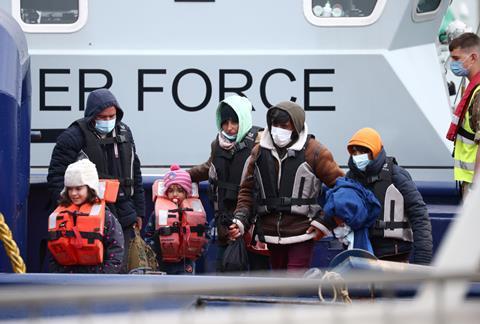When we fail to see people as made in God’s image, we fail them as humans, says George Pitcher. It is our ability to ‘other’ people and put them in categories that leads to the worst of human behaviour

A much-loved member of our congregation told me after church last Sunday that most of the illegal migrants landing on our shores were Albanians. Members of his family had visited Albania recently – in fact, one of them is Albanian – and found that the country is, in my friend’s words, “not too bad”. As supporting evidence, he revealed that they stayed in a 4-star hotel.
It’s easy to mock this view (which he expressed to me because I’m reckoned, here in Sussex, to be more sympathetic to small boat migrants than most) with the summary that the case for Albanians staying in their own country rests on the fact that they have a half-decent hotel. But there’s more to it than that.
Christ only ever saw the person – in the lame, the leper, the excluded and the marginalised
This conversation has stayed with me because of another story that has emerged this week: The Guardian’s founding investment being unequivocally linked to the slave trade. I’m very fond of this newspaper and its journalists (mostly) and I’m happy to contribute to its content and its finances when I can.
Cognitive dissonance
But I can’t be alone in finding it a teeny bit delicious that a piety born of its excellent work on the Windrush scandal and the Black Lives Matter movement is somewhat undermined by its own connections with enslavement and oppression.
The Guardian’s editor, Katharine Viner, rejected (rightly in my view) charges of hypocrisy on Radio 4, preferring the phrase “cognitive dissonance”. Again, we can mock: Boris Johnson was not being hypocritical when he partied in Number 10, having banned the country from doing so, he was just being cognitively dissonant.
Actually, Viner had lifted the phrase from one of the historians she had commissioned to investigate her company’s connection with slavery, Professor David Olusoga. He wrote a very substantial piece that revealed the self-blinding tricks our nation has employed in order to re-invent our shameful history.
Human cargo
I’d like to propose that we do the same to re-invent our present.
There is an idea that small boats in the Channel are full of cynical young Albanian men, bent on stripping our economy (never mind that we have a labour shortage); that the boats are full of rapists and drug dealers; that we’re being swamped or invaded by Channel migrants when millions more have arrived at our airports.
This goes beyond cognitive dissonance. It contrasts our guilt over slavery with our apparent lack of it over the way we treat our immigrants and refugees. The latest proposal is to accommodate them, as a deterrent, in old construction barges.
That’s not only reminiscent of the monstrous estuary prison-hulks, immortalised by Charles Dickens’ Great Expectations, but also reprises from the slave trade the image, or even the concept, of human cargo.
What it means to be human
At the heart of both these issues - slavery and migration - is a theological school called Personalism. This holds that there is something very significant about the human person that is irreducible. In a happy irony, Personalism itself seems irreducible from its very many interpretations.
But, for our purposes here, it’s sufficient to say that its central tenets mark out the definition between a person and an individual; that a person can’t be defined by a checklist of human standards and only really exists in relationship with other persons.
This goes beyond cognitive dissonance and contrasts our guilt over slavery with our apparent lack of it over the way we treat refugees
It’s a very big idea in Catholic doctrine. Pope John Paul II wrote in 1981 that a person “cannot be treated as an object of use and as such the means to an end… the person is a good towards which the only proper and adequate attitude is love.” That pretty much deals with the slave trade.
As to migrants, Pope Benedict XVI wrote in 2009 that “the human creature is defined through interpersonal relations. The more authentically he or she lives these relations, the more his or her own personal identity matures. It is not by isolation that man establishes his worth, but by placing himself in relation with others and with God.” And, one might add, not by placing others in insanitary barges.
I see you
What this tells us is that in failing migrants, we fail to see each person. For the slave trader, as for my friend in the pub last Sunday, there is no person, only a category of humanity that can be dealt with in a single, prescribed manner, by persons “like us”.
Next week, at Easter, the Church marks the destruction of the personhood of the Christ, by a political people who would not or could not see the person but, instead, simply saw a threat to their invented human order. In contrast, Christ only ever saw the person – in the lame, the leper, the excluded and the marginalised.
As we approach Holy Week, this nation has a choice: We can adopt the mindset of the historical slaver and lift it into today’s response to migration, by refusing to see a person but only a statistic. Or we can act in persona Christi, in the person of Christ, and in doing so act as authentic persons ourselves.





































No comments yet